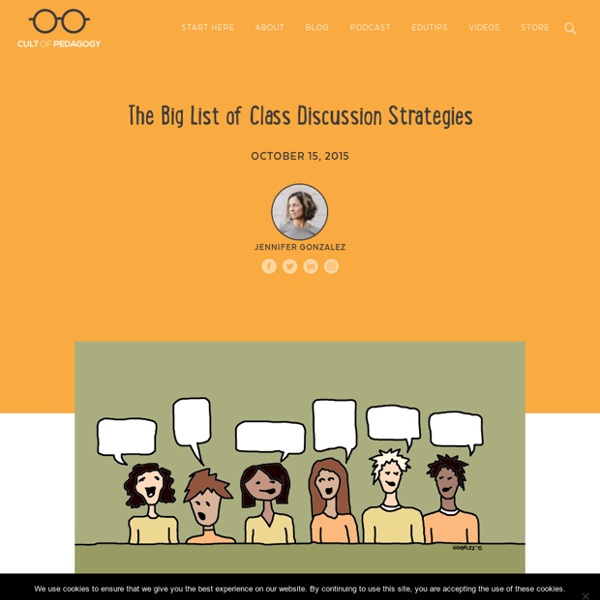



https://www.cultofpedagogy.com/speaking-listening-techniques/
Related: Week 6: Managing Instruction (* = Key reading) • Speaking • Litteraturundervisning • Engagement and Sensory Immersion • Critical Thinking*Robert Mager's Performance-Based Learning Objectives (useful for your Assignment 3: Critical Issues Workshop!) You don’t have to read up on learning objectives for too long before you run into the name of Robert Mager and hear about his performance-based learning objectives. These are also sometimes called three-part learning objectives or behavioral learning objectives. This isn’t necessarily the only way to write learning objectives. Smart people have continued to think about training and the development of learning objectives since Mager’s time, after all. But even though there are other schools of thought about learning objectives, what Mager had to say is still solid advice in many cases. And, as they taught us when we were kids, it’s a good idea to get the basics down before you begin experimenting (while riding bikes, they taught us to ride normally before going with no hands; while playing baseball, they taught us to throw a fastball before trying a curve; while writing, they taught us to print before teaching us cursive).
101 Conversation Starters (Also see How to Start a Conversation) Ice Breakers Where did you grow up? Socratic Seminars "The unexamined life is not worth living."-Socrates Background A List Of 50+ Teaching Strategies To Jumpstart Your Teacher Brain Teaching strategies are among the most important ingredients for highly-effective learning environments. In addition to literacy strategies, approaches to assessment, and grouping strategies (among many others), knowing the right teaching strategy for the right academic situation may not be a matter of expertise or training, but memory: out of sight, out of mind, yes? Which makes the following infographic from fortheteachers.org useful.
Socratic Seminars: Making Meaningful Dialogue Socratic Seminars: Making Meaningful Dialogue The Common Core State Standards for speaking and listening state that in order for students to be ready for college and career, they must have “ample opportunities to take part in a variety of rich, structured conversations,” and “listen attentively to others so that they are able to build on others’ meritorious ideas while expressing their own clearly and persuasively.” Socratic Seminars embody these expectations of the Common Core and are a meaningful way to engage students from upper elementary grades through twelfth grade. Named after the philosopher Socrates, the Socratic Seminar is a structured dialogue between students about important ideas or moral and ethical issues found in a text or across multiple texts. Prior to their engagement in the Socratic Seminar, students prepare for the discussion by reading and annotating a text the teacher has selected.
*Why Ownership? ( Hilda K. Weisburg) Although it’s been around for a while, “ownership” has become one of the latest buzz words. It has always been important for you as a leader to own your library program, but there are others who need ownership as well. Owning leads to lifelong learning for students, and involvement and investment in your program from teachers and administrators. Consider the difference in renting or owning a home.
Teaching English Literature Using A Socratic Seminar Common core State Standards ELA: English Language Arts W: Writing Standards 6-12 9-10: 9th & 10th Grades 1a: Write arguments to support claims in an analysis of substantive topics or texts,using valid reasoning and relevant and sufficient evidence.a. Introduce precise claim(s), distinguish the claim(s) from alternate oropposing claims, and create an organization that establishes clearrelationships among claim(s), counterclaims, reasons, and evidence.b. Develop claim(s) and counterclaims fairly, supplying evidence for eachwhile pointing out the strengths and limitations of both in a manner thatanticipates the audience's knowledge level and concerns.c. Use words, phrases, and clauses to link the major sections of the text,create cohesion, and clarify the relationships between claim(s) and reasons,between reasons and evidence, and between claim(s) and counterclaims.d. Download Common Core State Standards (PDF 1.2 MB)
Project ECS@ESC The GENOVESI ENVIRONMENTAL STUDY CENTER (ESC) offers rich and engaging experiential environmental science programs for students and teachers at all grade levels. Nestled in the Bergen Beach section of Brooklyn, this 7,000 square foot learning center, sitting on over an acre of beautiful grounds, is home to over 200 living organisms, four dynamic learning labs (Flora, Fauna, STEM and a fully equipped biotechnology lab), an outdoor learning space with pond habitat and a greenhouse laboratory. As a premier informal science destination space, ESC’s mission is to deliver hands on environmental science and STEM instruction. Through targeted standards-based enrichment programs, ESC’s highly trained staff encourage students to explore the urban habitats around them and become stewards for the environment.